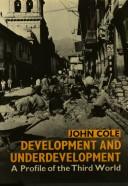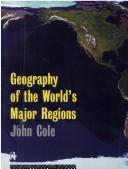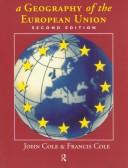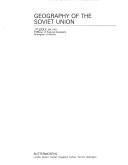| Listing 1 - 9 of 9 |
Sort by
|

ISBN: 0416920802 9780416920802 0416920705 9780416920703 Year: 1987 Publisher: London Methuen
Abstract | Keywords | Export | Availability | Bookmark
 Loading...
Loading...Choose an application
- Reference Manager
- EndNote
- RefWorks (Direct export to RefWorks)
Third World: economic development problems --- Economic development --- Case studies --- Developing countries --- Economic conditions --- -Economic development --- -Development, Economic --- Economic growth --- Growth, Economic --- Economic policy --- Economics --- Statics and dynamics (Social sciences) --- Development economics --- Resource curse --- -Economic conditions --- Economic conditions. --- Developing countries: economic development problems --- Economic development - Case studies --- Third World economic development --- Developing countries - Economic conditions

ISBN: 0415117437 0415117429 Year: 1996 Publisher: London Routledge
Abstract | Keywords | Export | Availability | Bookmark
 Loading...
Loading...Choose an application
- Reference Manager
- EndNote
- RefWorks (Direct export to RefWorks)
Geography --- Région géographique --- geographical regions --- Démographie --- Demography --- statistiques économiques --- economic statistics --- Donnée statistique --- statistical data --- world --- 911 --- Systematische geografie. Geofactoren. Geografie--(in het algemeen) --- Geography. --- Geografie --- Sociale geografie --- Algemene Werken. --- Cosmography --- Earth sciences --- World history --- Géographie --- Monde
Book
Year: 1967 Publisher: Harmondsworth (Middlesex) Penguin
Abstract | Keywords | Export | Availability | Bookmark
 Loading...
Loading...Choose an application
- Reference Manager
- EndNote
- RefWorks (Direct export to RefWorks)

ISBN: 041514311X 0415143101 Year: 1997 Publisher: London Routledge
Abstract | Keywords | Export | Availability | Bookmark
 Loading...
Loading...Choose an application
- Reference Manager
- EndNote
- RefWorks (Direct export to RefWorks)
Economic geography --- European Union --- Regionalism --- Régionalisme --- European Economic Community --- European Economic Community countries --- Pays de l'Union européenne --- Economic conditions --- Conditions économiques --- European Union. --- European Union countries --- Economic conditions. --- 914 --- Aardrijkskunde van Europa --- Geography of Europe --- Régionalisme --- Pays de l'Union européenne --- Conditions économiques --- E.U.
Book
ISBN: 128353133X 9786613843784 0773585591 9780773585591 9780773538863 0773538860 9781283531337 6613843784 Year: 2011 Publisher: Montreal, Que. McGill-Queen's University Press
Abstract | Keywords | Export | Availability | Bookmark
 Loading...
Loading...Choose an application
- Reference Manager
- EndNote
- RefWorks (Direct export to RefWorks)
"Students of the French Revolution and of women's right are generally familiar with Olympe de Gouges's bold adaptation of the Declaration of the Rights of Man and of the Citizen. However, her Rights of Woman has usually been extracted from its literary context and studied without proper attention to the political consequences of 1791. In Between the Queen and the Cabby, John Cole provides the first full translation of de Gouges's Rights of Woman and the first systematic commentary on its declaration, its attempt to envision a non-marital partnership agreement, and its support for persons of colour. Cole compares and contrasts de Gouges's two texts, explaining how the original text was both her model and her foil. By adding a proposed marriage contract to her pamphlet, she sought to turn the ideas of the French Revolution into a concrete way of life for women. Further examination of her work as a playwright suggests that she supported equality not only for women but for slaves as well. Cole highlights the historical context of de Gouges's writing, going beyond the inherent sexism and misogyny of the time in exploring why her work did not receive the reaction or achieve the influential status she had hoped for. Read in isolation in the gender-conscious twenty-first century, de Gouges's Rights of Woman may seem ordinary. However, none of her contemporaries, neither the Marquis de Condorcet nor Mary Wollstonecraft, published more widely on current affairs, so boldly attempted to extend democratic principles to women, or so clearly related the public and private spheres. Read in light of her eventual condemnation by the Revolutionary Tribunal, her words become tragically foresighted: "Woman has the right to mount the Scaffold; she must also have that of mounting the Rostrum."--Publisher's website.
Feminists --- Women's rights --- Rights of women --- Women --- Human rights --- History --- Civil rights --- Law and legislation --- Legal status, laws, etc. --- Gouges, Olympe de, --- Gouze, Marie, --- Auby, Marie Gouze, --- De Gouges, Olympe, --- Gouge, --- France. --- France --- Bro-C'hall --- Fa-kuo --- Fa-lan-hsi --- Faguo --- Falanxi --- Falanxi Gongheguo --- Faransā --- Farānsah --- França --- Francia (Republic) --- Francija --- Francja --- Francland --- Francuska --- Franis --- Franḳraykh --- Frankreich --- Frankrig --- Frankrijk --- Frankrike --- Frankryk --- Fransa --- Fransa Respublikası --- Franse --- Franse Republiek --- Frant︠s︡ --- Frant︠s︡ Uls --- Frant︠s︡ii︠a︡ --- Frantsuzskai︠a︡ Rėspublika --- Frantsyi︠a︡ --- Franza --- French Republic --- Frencisc Cynewīse --- Frenska republika --- Furansu --- Furansu Kyōwakoku --- Gallia --- Gallia (Republic) --- Gallikē Dēmokratia --- Hyãsia --- Parancis --- Peurancih --- Phransiya --- Pransiya --- Pransya --- Prantsusmaa --- Pʻŭrangsŭ --- Ranska --- República Francesa --- Republica Franzesa --- Republika Francuska --- Republiḳah ha-Tsarfatit --- Republikang Pranses --- République française --- Tsarfat --- Tsorfat --- Γαλλική Δημοκρατία --- Γαλλία --- Франц --- Франц Улс --- Французская Рэспубліка --- Францыя --- Франция --- Френска република --- פראנקרייך --- צרפת --- רפובליקה הצרפתית --- فرانسه --- فرنسا --- フランス --- フランス共和国 --- 法国 --- 法蘭西 --- 法蘭西共和國 --- 프랑스 --- France (Provisional government, 1944-1946) --- Women. --- Gouges, de, Olympe --- Déclaration des droits de l'homme et du citoyen. --- Geschichte 1700-1800.
Book
Abstract | Keywords | Export | Availability | Bookmark
 Loading...
Loading...Choose an application
- Reference Manager
- EndNote
- RefWorks (Direct export to RefWorks)

ISBN: 0408497521 Year: 1984 Publisher: London Butterworths
Abstract | Keywords | Export | Availability | Bookmark
 Loading...
Loading...Choose an application
- Reference Manager
- EndNote
- RefWorks (Direct export to RefWorks)
Book
ISBN: 0471164763 0471164755 9780471164753 9780471164760 Year: 1969 Publisher: London Wiley
Abstract | Keywords | Export | Availability | Bookmark
 Loading...
Loading...Choose an application
- Reference Manager
- EndNote
- RefWorks (Direct export to RefWorks)
Geography --- Mathematics. --- Mathematics --- Methodology --- Didactics of geography --- Physical geography --- Teaching aids --- Economic geography --- 911 --- Systematische geografie. Geofactoren. Geografie--(in het algemeen) --- Géographie --- Mathématiques --- Geography - Mathematics
Book
ISBN: 9781946684769 1946684767 9781946684776 9781946684752 1946684775 1946684759 Year: 2019 Publisher: Morgantown West Virginia University Press
Abstract | Keywords | Export | Availability | Bookmark
 Loading...
Loading...Choose an application
- Reference Manager
- EndNote
- RefWorks (Direct export to RefWorks)
"How well do we really know Pearl S. Buck? Many think of Buck solely as the Nobel laureate and Pulitzer Prize-winning author of The Good Earth, the novel that explained China to Americans in the 1930s. But Buck was more than a novelist and interpreter of China. As the essays in Beyond The Good Earth show, she possessed other passions and projects, some of which are just now coming into focus. Who knew, for example, that Buck imagined and helped define multiculturalism long before it became a widely known concept? Or that she founded an adoption agency to locate homes for biracial children from Asia? Indeed, few are aware that she advocated successfully for a genocide convention after World War II and was ahead of her time in envisioning a place for human rights in American foreign policy. Buck's literature, often dismissed as simple portrayals of Chinese life, carried a surprising degree of innovation as she experimented with the styles and strategies of Modernist artists. In Beyond The Good Earth, scholars and writers from the United States and China explore these and other often overlooked topics from the life of Pearl S. Buck, positioning her career in the context of recent scholarship on transnational humanitarian activism, women's rights, and civil rights activism"--
Novelists, American --- Women political activists --- Political activists --- American novelists --- Political activity --- Buck, Pearl S. --- Buck, Pearl Sydenstricker --- Buck, Pearl --- Pearl Buck --- Buck, Paerl S. --- Paerl S. Buck --- Bak, Bīrl, --- Bak, Perl, --- Bak, Pērla, --- Bāk, Pirl, --- Baka, Parla, --- Baka, Pērla S., --- Bŏk, Pʻŏl S., --- Buck, Pearl, --- Bŭk, Pŭrl, --- Pak, Pērl Es., --- Sai, Chen-chu, --- Sai, Zhenzhu, --- Walsh, Pearl Sydenstricker Buck, --- בוק, פירל --- בוק, פירל ס. --- باک، پرل --- بك، بيرل --- 賽珍珠, --- 賽珍珠 --- Sai Zhenzhu --- 赛珍珠 --- sai zhen zhu --- Sedges, John, --- Political and social views --- Criticism and interpretation
| Listing 1 - 9 of 9 |
Sort by
|

 Search
Search Feedback
Feedback About UniCat
About UniCat  Help
Help News
News